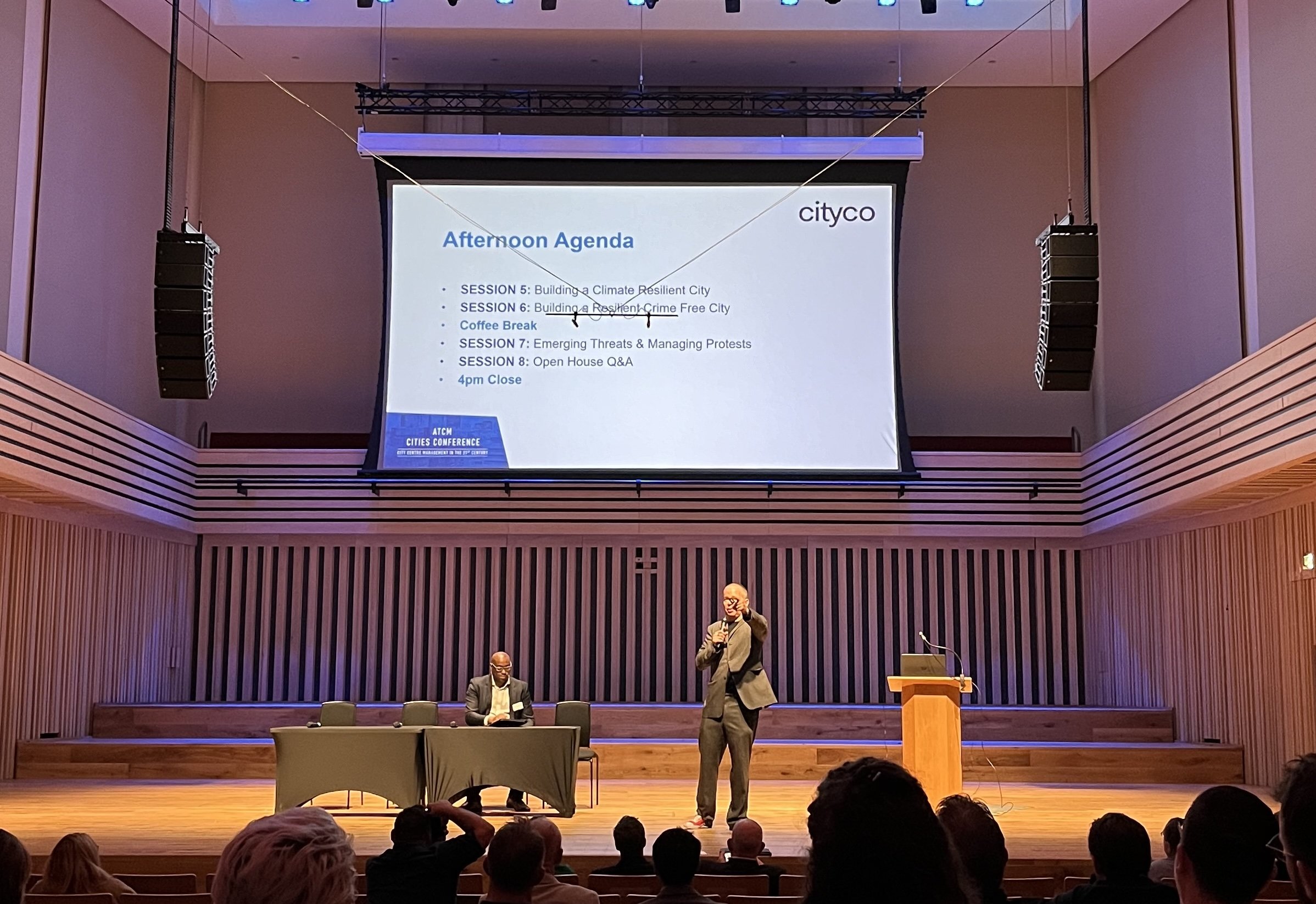Building Climate-Resilient and Crime-Free Cities
Vaughan Allen, CEO at CityCo Manchester and Manchester BID introducing the afternoon agenda at the ATCM Cities Conference 2024.
Insights from the ATCM Conference
At the ATCM Cities Conference, sustainability and safety were high on the agenda, with city leaders and BID executives discussing innovative strategies to build climate-resilient and crime-free urban spaces. As cities continue to grow, managing environmental risks and ensuring safety in public spaces are essential to creating thriving urban environments.
1. Building Climate-Resilient Cities
As the world faces the escalating impact of climate change, cities must take urgent action to mitigate environmental threats and reduce their carbon footprints. In the UK, BIDs are playing a pivotal role in making this happen.
Stefan Gurney and Michael Yates from Norwich BID shared their ambitious vision to transform Norwich into an energy community. By leveraging solar power, they plan to produce 146% of the city's annual electricity consumption, allowing businesses to share surplus energy locally. This initiative would keep energy benefits within Norwich, making the city more self-sufficient and sustainable. With 56 climate projects underway, this is a truly exciting initiative and shows real leadership.
In Reading, Alexa Volker, BID Manager for Reading Central and Abbey Quarter, outlined the city's efforts to become more environmentally friendly. Activities such as weekly cardboard recycling and the creation of wildflower corridors have not only reduced waste but also enhanced the city's biodiversity. A standout project involved the development of reedbeds in the town's canal, part-funded by the BID, to promote ecological health.
Meanwhile, Nadia Broccardo, CEO of Team London Bridge, presented the district’s Net Zero Routemap, which aims to make London Bridge one of the world’s most sustainable business districts. Key initiatives include a Decarbonisation Charter signed by 45 local businesses and a district heat network, which utilises excess heat from commercial buildings to support local hospitals. These projects illustrate how BIDs can be central to achieving net-zero goals in urban areas by partnering and leading initiatives.
2. Ensuring Safety in City Centers
Urban safety is becoming an increasing priority for cities, particularly in the context of growing nighttime economies. The ATCM conference highlighted several successful strategies that BIDs have employed to create safer urban spaces.
Sharon Appleby, CEO of Sunderland BID, emphasised the important role that BIDs play in crime prevention. Safety initiatives, such as the use of facial recognition technology in Southampton, have yielded impressive results. As Stephen Manion, Executive Director of Go Southampton, shared, the introduction of this technology led to the identification of three offenders within 24 hours during a pilot trial. Despite much press negativity, the impact was mitigated by meticulous planning and city-goers were actually very welcoming of this new technology. Such initiatives showcase how BIDs can embrace advanced technology to address urban safety challenges while managing the legal and ethical concerns associated with surveillance.
Another innovative approach to urban safety comes from Leicester BID, led by Simon Jenner. With a focus on fostering a playful, inclusive nighttime economy, Jenner introduced the Walk Away Project, which uses data-driven subliminal messaging to encourage young men to avoid violence. Additionally, Leicester’s NTE medical services have provided over 1,000 interventions in 2023 alone, offering quick medical aid that has saved the NHS more than £500,000.
In Bath, the Safebus initiative, run by Allison Herbert of Bath BID, provides on-the-ground support for vulnerable people at night. With anti-spiking training and bystander intervention programs, Bath BID has created a safer environment for the city's 6 million annual visitors. The Safebus has documented cases of lives saved, offering a refuge for individuals in crisis.
3. Managing Emerging Urban Threats
The rise of social media creators (self proclaimed auditors) and urban explorers pose new challenges for city managers. These individuals often trespass into restricted areas or create disturbances to capture viral content. Alexandra King-Byatt, Managing Director of CityCo Manchester, discussed how these issues are difficult to address due to legal loopholes. Meanwhile, Superintendent Phil Spurgeon of Greater Manchester Police highlighted the operational challenges of enforcing laws during public protests, stressing the need for tolerance while maintaining public order.
Alexandra King-Byatt and Superintendent Phil Spurgeon address the ATCM cities conference.
Conclusion: A Sustainable and Safe Future for Cities
The ATCM Cities Conference emphasised the importance of sustainability and safety in creating resilient urban spaces. From climate action initiatives to advanced crime prevention technologies, BIDs are at the forefront of driving change. As cities continue to evolve, the role of BIDs in fostering safer, more sustainable environments will only become more critical.



